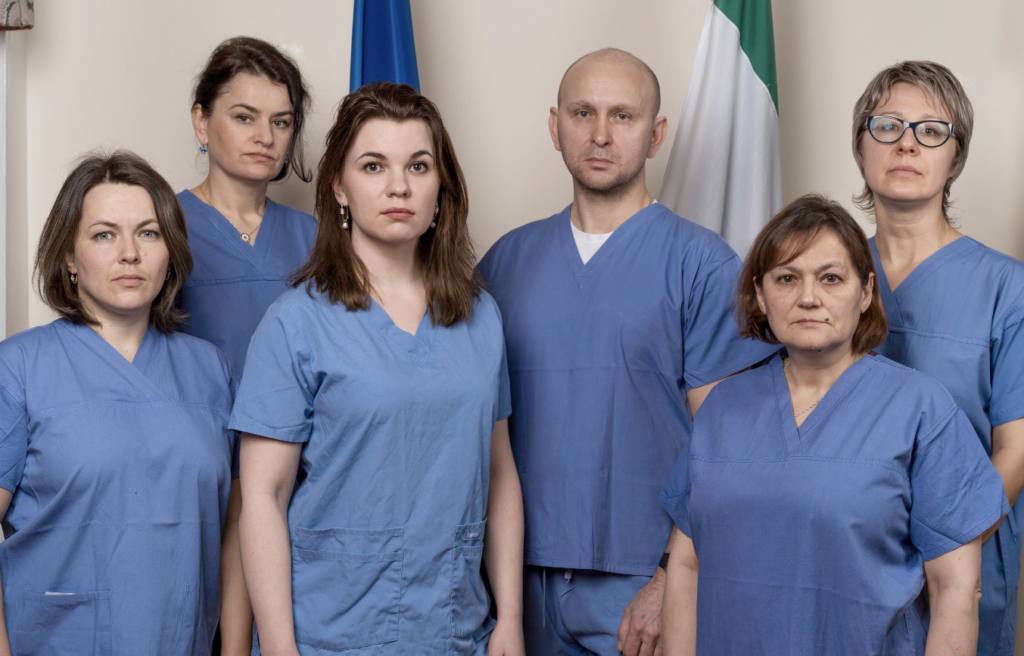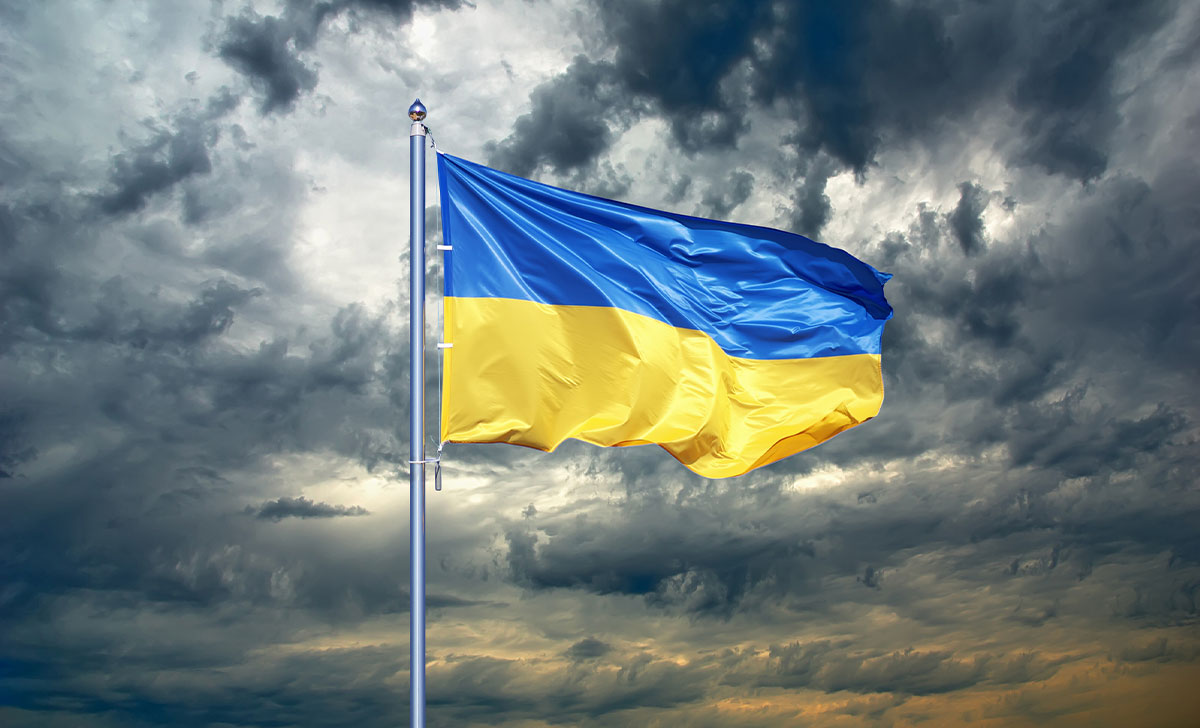Doctors have utilised online tools in an effort to mobilise help for embattled Ukrainian healthcare colleagues, reports Bette Browne
The war in Ukraine has seen doctors and the public mobilise and transform social media into a powerful tool to get supplies and medical aid to the devastated country.
Within days of the Russian invasion on 24 February, a group of Ukrainian doctors in the Irish healthcare system established ‘Medical Help Ukraine’ to urgently deliver medical aid from Ireland to Ukraine.
Consultants, GPs, and NCHDs, supported by the Ukrainian Embassy of Ireland, Lifeline Ambulance Services, and the HSE, sent emergency medical supplies and ambulance cars to Ukrainian war zones.
Mobilisation
“Our country is being destroyed and innocent children and civilians are suffering. Within the few short days of entering Ukraine, the invading Russian army have bombed our hospitals and ambulances,” Dublin GP and Ukrainian native Dr Kateryna Kachurets, one of the organisers of Medical Help Ukraine, said on its website.
The group set up a GoFundMe page that raised over half a million euro in a matter of days for provision of medical supplies.
On 16 March, nine fully equipped ambulances from the HSE, stocked with extra medical supplies, left Rosslare as part of another Medical Help Ukraine delivery from Ireland.
The group, which includes Ukrainian doctors based in Cork, Limerick and Waterford, gets an updated list every week from Ukrainian hospitals, coordinated by one of their partners in Lviv, western Ukraine. They are also in close contact with the Ministry of Health in Ukraine.
“This is a humanitarian crisis, the quicker we can do things the better,” Dr Kachurets said, adding that their trucks have a “green corridor” to pass through the borders between Ireland and Ukraine. This is necessary to avoid delays, but also to ensure safe passage of controlled drugs like morphine that usually require permits.
Ireland also provided a donation from the Irish Blood Transfusion Service of 4,000 blood bags. A second donation, coordinated by the HSE, included 10,000 bio protection suits, 50,000 medical protective masks and 2,583 litres of disinfectant. These donations have been provided through the EU Civil Protection Mechanism.
The healthcare system in Ukraine is clearly under significant strain and its collapse would be a catastrophe
‘Collaborative generosity’
Another Irish humanitarian aid effort, known as Aid from Ireland, saw about 25 trucks departing Dublin with 500 tonnes of medical aid, food supplies, and clothing.
One of the organisers of the 8 March convoy was Dublin businessman Mr John Tuohy, whose background is in transport and logistics. He told the Medical Independent (MI) the initiative was rooted in the “collaborative generosity” of the public and companies responding to a humanitarian crisis.
“One of my contacts in the logistics business is a Ukrainian, named Tetyana Buhera, who has lived in Ireland for six years with her husband and children,” he told MI. “She evacuated her mother from Ukraine to Ireland and her brother remains there to fight in the war. Tetyana is in regular contact with Ukrainian officials to determine what aid and types of items we need to prioritise.
“Tetyana and I have been focused on linking donors of funding and goods to transport providers (tapping into) a huge wave of collaborative generosity sweeping Ireland.”
There has also been a huge response to an online register set up by the Irish Red Cross to help Ukrainian refugees in Ireland. The organisation opened its online ‘register of pledges’ at the beginning of March and within days more than 15,000 people had registered to help with offers of goods, services and accommodation.

Financial donations also came pouring in to the organisation with €750,000 contributed in just 24 hours.
The funds will go directly to Red Cross partners in Ukraine and neighbouring countries to help their humanitarian efforts. “Our immediate priority is to support the delivery of shelter, food, medical care, and other basic necessities to vulnerable families,” Ms Florence Gillette, Head of the International Committee of the Red Cross (ICRC) delegation in Kyiv, stated on the ICRC’s website in February.
“We are extremely concerned that the conflict is affecting very densely populated areas. As we have seen time and time again in our work all over the world, when neighbourhoods become the frontline, the consequences for people, including children, the sick, the elderly, are simply devastating. We are calling urgently on parties to the conflict not to forget their obligations under international humanitarian law.”
A message of concern and support also came from the Medical Council. Its President, Dr Suzanne Crowe, writing on 4 March to Ukrainian doctors on the medical register, said: “I do not have the words to express how I feel, how we all feel, about the great suffering and immense challenges Ukraine and all of its people are facing due to unwarranted and unacceptable Russian aggression. As a paediatric doctor, working in intensive care in a large children’s hospital, watching the news footage of critically sick children being treated in the basement of a hospital is something that I cannot fathom.”
Under an emergency EU decision, Ukrainian refugees should have access to healthcare, employment, education, housing, and social welfare in EU member states and thousands of refugees have been welcomed across Ireland.
Healthcare attacks
As the war intensified, hospitals and healthcare facilities increasingly came under attack. Ukrainian officials said on 9 March that Russia bombed a children’s hospital and maternity ward in Mariupol. The attack was reported to have killed at least three people and injured more than a dozen others.
Ukraine’s President Volodymyr Zelenskiy wrote on Twitter that the attack on the hospital had left a number of people, including children, trapped beneath the wreckage and called it an “atrocity”. A video shared by the President showed hallways strewn with twisted metal, rooms with blown-out windows and floors covered in debris.
The attack on the hospital was condemned by leaders around the world, including in Ireland. “With multiple reports of a missile strike destroying maternity and children’s hospital in Mariupol, despite ceasefire agreement, the indiscriminate cruelty of Putin’s invasion is crystal clear. This war on civilians must end,” the Taoiseach tweeted.
The World Health Organisation’s (WHO) surveillance system for attacks on healthcare (SSA) documented 31 attacks on healthcare facilities in the first two weeks of the war, describing them as acts of “unconscionable cruelty” that were killing patients and healthcare workers and destroying the country’s health infrastructure.
“These horrific attacks are killing and causing serious injuries to patients and health workers, destroying vital health infrastructure and forcing thousands to forgo accessing health services despite catastrophic needs,” outlined a statement signed by the heads of the United Nations Children’s Fund, the UN Population Fund and the WHO.
“To attack the most vulnerable – babies, children, pregnant women, and those already suffering from illness and disease, and health workers risking their own lives to save lives – is an act of unconscionable cruelty.
“In Ukraine, since the start of the war, 31 attacks on healthcare have been documented via the WHO’s surveillance systems for attacks on health care. According to these reports, in 24 incidents healthcare facilities were damaged or destroyed, while in five cases ambulances were damaged or destroyed. These attacks have led to at least 12 deaths and 34 injuries and affected access to and availability of essential health services.
“The healthcare system in Ukraine is clearly under significant strain and its collapse would be a catastrophe. Every effort must be made to prevent this from happening. International humanitarian and human rights law must be upheld.”
But the attacks continued unabated. On 15 March, Russian forces entered the largest hospital in Mariupol, the Regional Intensive Care Hospital, and prevented doctors and patients from leaving the building, according to the city’s deputy mayor, Mr Sergei Orlov.
Medical education
Internationally, doctors have been providing training to assist colleagues in Ukraine, particularly in regard to trauma care provision.
In Canada, Ukrainian medical student Ms Darya Naumova at McGill University in Montreal has helped to coordinate the production and transfer of training videos from Canada to medics in Ukraine.
“We have a trauma surgeon in Kyiv who has been working with us over the last three years. As soon as the war broke out, we’ve been in contact with him every day,” she told Al Jazeera on 11 March. “These instructional videos are something we identified as a common ground where we can help.”
The training videos are produced by a team of healthcare workers in a simulated operating room at McGill’s Steinberg Centre for Simulation and Interactive Learning and cover a range of issues, including how to put a tube into a patient’s chest to evacuate air or blood.
The Centre for Global Surgery (CGS) at McGill University Health Centre has been offering trauma care training in Ukraine for over a decade. “The CGS is collaborating with its colleagues in Ukraine, providing telehealth support and teaching modules for the training of family physicians and others dealing with injured victims,” according to its website. “CGS co-directors have worked and taught in the hospitals touched by the bombings. They are experts at implementing education programmes.”
Dr Dan Deckelbaum, the centre’s co-Director, said they first began this educational work in Donetsk, eastern Ukraine, before expanding to Odesa, Kyiv, and Lviv, among other cities. When Russia invaded, Dr Deckelbaum contacted his Ukrainian healthcare colleagues, who asked if the centre could provide them with training videos to help provide basic, but potentially lifesaving, care.
So far, they have produced about a dozen training videos geared especially to medical professionals who are not surgeons.
That is crucial, Dr Deckelbaum said, because during an armed conflict almost everybody is mobilised to provide care to injured victims. “You can be a dermatologist, an internist, a cardiologist, and you may have not done this procedure ever or it’s been a very long time. But now, during the war, you’re called upon to actually perform these life-saving procedures,” he told Al Jazeera in March.
In London, just days after the Russian invasion of Ukraine, former consultant surgeon Mr David Nott rapidly developed a surgical training course for doctors working to save lives amid the devastation.
Under the auspices of the David Nott Foundation, he and former neurosurgeon Mr Henry Marsh delivered a 12-hour surgical training course over Zoom to 570 healthcare professionals.
“When the crisis unfolded in Ukraine, we knew we had to spring into action and condense my 25 years of war surgery experience on the frontline into a 12-hour course for those in need. We condensed our five-day surgical training course into a comprehensive 12-hour course online,” Mr Nott explained on the Foundation’s website.

“To ensure healthcare professionals in Ukraine are best prepared for complex war injuries, the course included triage, damage control, burns, cardiothoracic, orthopaedic, paediatric, and plastic surgery sessions. Mr Marsh, who was pioneer of surgical advances in Ukraine, led the neurosurgery session of the course.
“The attendees learned a range of skills that can be used when faced with limited resources, from learning how to create makeshift pelvic binders to knowing when to operate without a CT scanner.”
The online initiative was commended by Mr Vadim Corjos, a General Surgeon from Ukraine based in the UK. He described the training course as “the fullest and deepest course for surgeons who are in war zones. Providing this course for (Ukrainian) surgeons gives a very good base to save more lives in war and conflict areas.”
As a result of the war, all scheduled cancer care across Ukraine was stopped because more than 60 hospitals were badly damaged in attacks, according to a Ukrainian oncologist.
Oncology
“In the city of Kharkiv, with an approximate population of one and a half million citizens, the one oncological hospital is destroyed, the only hospital in this area,” said Dr Andriy Hrynkiv, a Surgical Oncologist at the Lviv Regional Cancer Centre of Ukraine. He was speaking at a webinar organised by the European Cancer Organisation (ECO) and the American Society of Clinical Oncology (ASCO).
“In the city of Kyiv, with an approximate population of three million citizens, three oncology centres are providing just emergency care and outpatient chemotherapy. Doctors who work in the epicentre of military actions are facing extreme psychological pressure, and even threat to their lives.”
The 10 March meeting at which Dr Hrynkiv spoke brought together global and regional cancer organisations to develop a cancer support network for Ukrainian refugees. The network is led by the ECO, ASCO and WHO.
The network will function as a hub that can be used to direct healthcare workers and patients to information in multiple languages and assist cancer groups and oncology professionals in Ukraine and across Europe.

“Most of the internal displaced persons are concentrated in the west of Ukraine, because this region is thought to be relatively safe. Only the city of Lviv provided shelter to more than 200,000 internally displaced persons,” Dr Hrynkiv said.
“In Ukraine, 150,000 new cases of malignant disease are diagnosed annually. Due to the pandemic, the number of stage III, stage IV cancer patients who need extensive treatment has significantly increased in the recent years. Historically, 9,000 from this number were diagnosed in the west, in our region. But (this will now) increase dramatically.
“The greatest burden will fall on the institution where I work, Lviv Regional Cancer Centre, because it’s a large oncological centre in western Ukraine. A lot of warehouses with medicines were destroyed or are unavailable due to logistic problems, so we are facing a serious problem due to the lack of medications and supplemental materials, like suture materials. Moreover, these drugs aren’t even commercially available,” Dr Hrynkiv told the meeting.
The damage to healthcare and to cancer centres in Ukraine are in violation of international humanitarian law in terms of attacks against hospitals and attacks against humanitarian convoys, the WHO’s Dr Richard Sullivan told the meeting.
“Current estimates suggest that there may be between four million and 5.4 million refugees eventually needing assistance outside Ukraine, and about 12 million to 13.5 million internally displaced people, predominantly from the northern, eastern, and southern parts of Ukraine.
“This is the fastest displacement, both internally and externally, that we’ve seen since the Second World War, and the numbers that the immediate host countries are having to cope with are truly astronomical,” Dr Sullivan said.
“A sustained response to the Ukraine crisis needs to include a long-term view of the management of cancer patients in the refugee population, from emergency support systems during the war through to the reconstruction of the Ukrainian cancer care ecosystem,” he said.
There is also an immediate mental health crisis within the Ukrainian refugee population, which has been heavily exposed to violence, he added.
“They’ve been separated in many cases from loved ones and family members. We have huge numbers of children who are on their own. Most of the refugees at the moment are women, children, and old men. We are already picking up significant mental health conditions.”
Like Ireland, many other EU member states have been sending medicines and medical devices to Ukraine and to refugees in neighbouring countries. The meeting was told it was vital that such unified humanitarian action should continue.
“There is an unprecedented level of coordination that is needed and unity. Unity in terms of sanctions, unity in terms of support,” Ms Sandra Gallina of the European Commission Directorate-General for Health and Food Safety told the webinar. “We have many requests from Ukraine, mainly for personal protective equipment, diagnostic material, and vaccines.
“We are helping the neighbouring countries with €90 million of emergency programmes to help the civilians affected in the war in Ukraine. We help the people in Ukraine. We help the people in Moldova, and we will mobilise €500 million for response activities dealing with the humanitarian conservancies of the crisis.”
Médecins Sans Frontières (MSF) staff are also on the ground in Ukraine directly assessing humanitarian needs, delivering urgent medical supplies and providing training to hospitals on how to manage mass casualties.
“Some hospitals have been damaged and are also running short of essential supplies, including first aid kits,” MSF reported in early March. “The situation is dire.”
The Taoiseach heard a similar message from President Zelenskiy in a 20-minutes phone call between the two men on 16 March, when the President also expressed his appreciation for the support Ireland has already shown his country.
“He thanked us for our continued humanitarian aid, shelter, global support and sanctions against Russia,” the Taoiseach tweeted after the call. “I told him the Irish people stand fully behind Ukraine.”
At the end of March another major shipment of medical equipment and supplies left Ireland. Medical Help Ukraine said deliveries were continuing into April and beyond.
For further information, visit https://medicalhelpukraine.com













Leave a Reply
You must be logged in to post a comment.